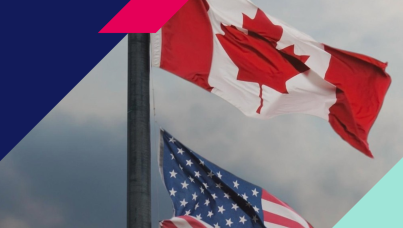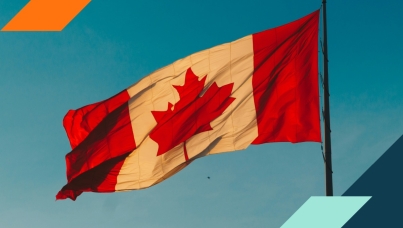While Nine in Ten (90%) Canadians Describe Their Mental Health as Good or Better, One in Three (33%) Canadians
Classify as being High Risk for Mental-Health Issue
The Mental Health Index was created by understanding Canadians' experiences concerning stress and depression over the last year:
- Perhaps most seriously, regarding feeling depressed to the point that they felt sad or hopeless almost every day for a couple weeks or more, 15% of Canadians say this happened to them on several occasions in the past year, and 17% said this has happened to them at least once. Two in three (67%) never reached this stage.
- When it comes to feeling stressed to the point where it had an impact on how they live their daily life, 30% of Canadians said this happened several times in past year, while 22% said it happened once while 48% didn't experience this type of stress.
- On the topic of feeling stressed to the point where they felt they could not cope or deal with things, 17% of Canadians reached this point on several occasions in the past year, with an additional 20% saying it happened to them once. Two in three (63%) said they didn't reach this stage at all in the past year.
A respondent was classified as low risk if they said "never" to all three scenarios measured. A high risk Canadian is someone who said "several times" to two or three of these scenarios. All other respondents fell into the moderate risk category.
Based on these definitions, one in three (33%) Canadians identify as high risk, while another 26% are at moderate risk of mental health issues. Just four in ten (42%) Canadians classify as low risk, based on their responses to the above scenarios.
The data reveal that some Canadians are far more likely to score as high risk in the mental health index. For example, women (35%) are more likely than men (30%) to classify as high risk, as are those whose household earns less than $40,000 a year (44%) compared to those who earn $40K to $60K (28%), $60K to $100K (30%) or more than $100K (23%).
But perhaps the most startling finding is generational: a majority (53%) of Millennials (aged 18 to 34) classify as being high risk, compared to 35% of Gen Xers (aged 35 to 54), and 14% of Baby Boomers (aged 55+). Atlantic Canadians (44%) are also considerably more likely than those in Saskatchewan and Manitoba (36%), Alberta (33%), Ontario (32%), Quebec (32%) and British Columbia (26%) to rate as high risk.
Canadians have outlined some of the ways that mental health issues have disrupted their lives in the past year. Two in ten (18%) have taken medication to help them with their mental health, for things like stress or depression. One in ten (12%) has missed social gatherings or family events due to their mental health, and a similar proportion (11%) has taken time off work or school to deal with a personal mental-health issue. One in twenty (5%) has even taken time off work or school to help a family member or close friend with a mental health issue.
The data reveal a silver lining, however, in that many (31%) Canadians are talking about mental health issues to others. One quarter (24%) have talked to their friends and family about mental health issues and concerns, while 16% have talked with their primary healthcare provider, like their family doctor, about their own mental health. One in ten (11%) have spoken with a counselor, psychologist or psychiatrist about their mental health. Those who are at high risk are most likely (61%) to have spoken with someone about their mental health, but that means that four in ten (39%) Canadians at high risk haven't talked to anybody else about their mental state. One in three (33%) at moderate risk have had a discussion with someone, while only 5% of low-risk Canadians are having these types of discussions.
These are some of the findings of an Ipsos poll conducted between April 16h and 20th, 2015. For this survey, a sample of 2,010 adults from Ipsos' Canadian online panel was interviewed online. Weighting was then employed to balance demographics to ensure that the sample's composition reflects that of the adult population according to Census data and to provide results intended to approximate the sample universe. The precision of Ipsos online polls is measured using a credibility interval. In this case, the poll is accurate to within +/ - 2.5 percentage points, 19 times out of 20, had all Canadian adults been polled. The credibility interval will be wider among subsets of the population. All sample surveys and polls may be subject to other sources of error, including, but not limited to coverage error, and measurement error.
For more information on this news release, please contact:
John Wright
Senior Vice President
Ipsos Public Affairs
(416) 324-2002
[email protected]
About Ipsos
Ipsos is an independent market research company controlled and managed by research professionals. Founded in France in 1975, Ipsos has grown into a worldwide research group with a strong presence in all key markets. Ipsos ranks third in the global research industry.
With offices in 87 countries, Ipsos delivers insightful expertise across five research specializations: brand, advertising and media, customer loyalty, marketing, public affairs research, and survey management.
Ipsos researchers assess market potential and interpret market trends. They develop and build brands. They help clients build long-term relationships with their customers. They test advertising and study audience responses to various media and they measure public opinion around the globe.
Ipsos has been listed on the Paris Stock Exchange since 1999 and generated global revenues of e1,669.5 ($2,218.4 million) in 2014.
Visit www.ipsos.com to learn more about Ipsos' offerings and capabilities.



